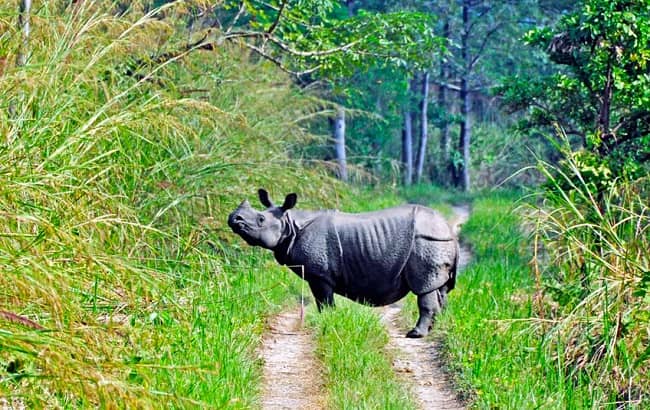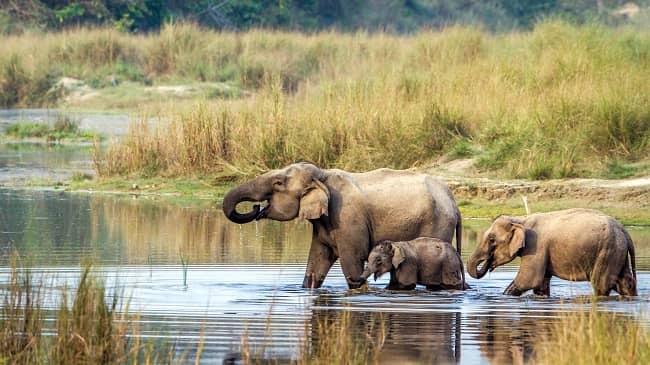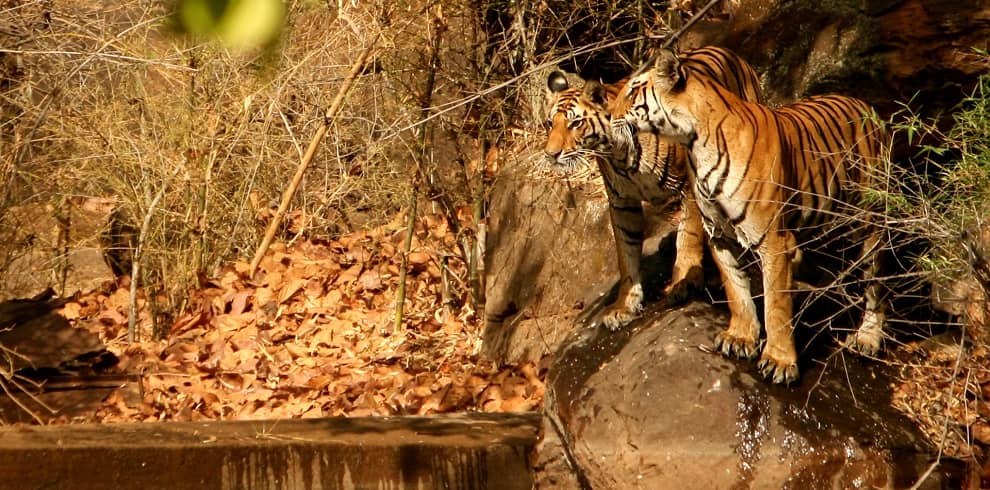Introduction To Chitwan National Park Safari In Nepal
Chitwan National Park was Nepal’s first national park. It was founded in 1973 as Royal Chitwan National Park and was designated as a World Heritage Site in 1984.
Chitwan National Park is located in Nepal’s south-central region and encompasses four districts: Nawalparasi, Parsa, Chitwan, and Makwanpur.
The districts of Chitwan and Kathmandu are connected by road and air. The national park of Sauraha, in Chitwan, is a popular tourist destination. The park is 932 km2 in size and is at an average elevation of 415 m (1,362 ft) (360 sq mi).
Chitwan literally translates to “jungle heart.” Chitwan National Park was formerly a lush jungle where the royal family went hunting for wildlife. However, since its designation as a national park, all forms of hunting have been prohibited.
Rhinos, Bengal tigers, Indian Rock Pythons, Rhesus monkeys, wild boars, deers, peacocks, alligators, gharials, and approximately 543 species of birds, including spotted eagles, kingfishers, storks, egrets, and babblers, are among the animals found in the national park.

Furthermore, near the national park, Beeshazari Lake, a Ramsar site, is a popular area for bird watching. For travel enthusiasts, a journey to Chitwan National Park is a once-in-a-lifetime opportunity.
We’ll start our journey from Kathmandu, winding over the hills, mesmerized by nature’s grandeur. When we arrive in Chitwan in the afternoon, our guide will brief us on the tour before taking us to the observation tower to witness the spectacular sunset.
The following day, we will enter the deep jungle abounding with wildlife on the back of an elephant or in a jeep. Finally, we’ll visit an elephant breeding center in the park, as well as bird-watching at Beeshazari Lake. We’ll make sure your trip is fun and rejuvenating from start to finish.
Highlights Of Chitwan National Park Safari In Nepal
- Riding on the back of an elephant to see one-horned rhinos and Royal Bengal tigers up close
- A diverse range of flora and fauna.
- Tharu culture is vibrant, and their tribal dance is captivating.

Trip Information
Customize Your Tour
The given itinerary is merely a suggestion. You may customize your trip by adding activities such as jeep safaris, elephant safaris, rafting, and more. Please contact us for additional information.
How Your Journey Toward Chitwan National Park Jungle Safari Will Start?
Tribhuvan International Airport, Nepal’s only international airport, would welcome you. Arrival in Kathmandu necessitates an overnight stay in a hotel. The next day, early in the morning, we will take a domestic flight to Bharatpur, which will take about an hour.
Don’t worry, We’ll Pick You up!
We offer complimentary airport pickup and drop-off in a private vehicle. Our staff will greet you with a customary offering of Khada or marigolds garland (symbolizing purity, benevolence, auspiciousness, and compassion) upon your arrival, and then transfer you directly to your hotel. To make use of this service, please send complete arrival and departure flight details by mail in advance.
Accommodation Details During The Chitwan National Park Tour!
With the great welcome of the local people, a visit to Chitwan National Park will make you feel at ease. Because you would want to recover before and after the trip, two nights in Kathmandu are essential and are not included in the package. There are hotels to suit all budgets. The room is virtually twin-sharing-style, with a bed, mattress, blanket, and pillows. The national park’s service providers and we have an excellent working relationship.
How about the Meals, Don’t you wanna know?
The dinner kit is quite useful. The plan includes three food items: four breakfasts, four lunches, and three dinners. The meals will be chosen from the lodge’s menu and will be fresh, hygienic, flavorful, and nutritional. Traditional local, Asian, and western cuisines are represented on the menu. Meals in Kathmandu are not included in the packages, although there is a wide selection of Nepalese and international cuisine to pick from, depending on our preferences.
Best Season for the Adventurous safari in Chitwan National Park
When planning a trip, one of the most crucial factors to consider is the weather. The Bardia National Park is open all year. However, the greatest time to visit is between February and June, when the dry season ends and the warmer season begins. We will have a better possibility of spotting tigers and rhinos around the water holes at this time. The park will be foggy in the winter, from November through January, and animals will hide in the dense woodland.
Passport and visa
Except for Indian nationals, all foreigners must have a valid visa to enter Nepal. At Tribhuvan International Airport and Nepal’s borders with India and Tibet, you can obtain an on-arrival visa. Visit www.immigration.gov.np. for additional details.
You’ll need a passport that’s valid for at least six months, a passport-size photo, and visa fees to apply for a visa. A 30-day visa costs $50 at the moment (to be paid in cash).
A free visa will be given to children under the age of ten. It is strongly recommended that you examine the current regulations. Visa regulations are subject to change at any time. Citizens of China and members of the South Asian Association for Regional Cooperation (SAARC) (Bangladesh, Bhutan, India, Maldives, Pakistan, and Sri Lanka) are exempt from visa fees.
Certain countries’ citizens may be denied a visa upon arrival. On-arrival visas are not available for citizens of Nigeria, Ghana, Zimbabwe, Swaziland, Cameroon, Somalia, Liberia, Ethiopia, Iraq, Palestine, and Afghanistan. If you are a citizen of one of these countries, please contact the Nepalese Embassy in your country.
Before we embark on our journey, we’ll double-check everything (luggage, equipment, etc.) during our briefing.
Money Exchange
You can exchange major foreign currencies through local banks and legitimate money exchanges in Kathmandu and all over Thamel. Legitimate money exchanges display their ongoing exchange rates visibly to the public.
Please note – only 100 INR (Indian Rupees) and 2000 INR notes are legal in Nepal.
Despite having the security advantage of traveler’s cheques, we prefer cash exchange. It helps avoid lengthy processes and high bank commissions.
You can withdraw cash (in Rupees)from ATMs all over Kathmandu and Thamel itself. Many of these ATMs are open around the clock. The maximum withdrawal amount is 35,000 Rupees for a 500 Rupees processing fee for foreign cards.
If you use the money exchange facilities at banks and financial institutions, they impose a service charge fee of about 4% or more.
During the trek, there are no banks and money exchange services so you should exchange your money in Kathmandu, depending on how much personal expense you require. Only Nepali Rupee is accepted in trekking regions.
Most established banks in Asia will only accept foreign currency notes that are not old, torn, or faded. Please ensure that you have new, clean notes.
Safety
We ensure the safety, security, and contentment of our clients. For us, the most crucial concern is safety. Our trip leaders and guides are well-versed on the subject and have received comprehensive first-aid training. We’ll all be together on the jungle walk to keep everyone safe and prevent anyone from wandering off alone.
Responsible travel
We are convinced that our ecosystem must be safeguarded, as tourism may have severe consequences. We emphasize the benefits of tourism to the environment. Furthermore, we collaborate with the Kathmandu Environmental Education Project (KEEP) to offer eco-friendly trips to the most environmentally sensitive and culturally enriching destinations that satisfy the needs of both tourists and locals.
Tipping
Most significantly, tipping is at the discretion of the traveler and should be based on excellent service that is not included in the salary of your guides, porters, and crew, but they are greatly appreciated. The tip is an established and respected means of saying thank you (Dhanyabaad) for good service in Nepalese culture.
Tipping is usually done at the end of the walk and is best done in a group. To mark the completion of the walk, most groups would present the tips at a farewell supper on the last evening or day of the trek.
The amount of the tip is totally up to you, and it may be more or less depending on the quality of the service, the length of the journey, your budget, and your appreciation of the job.
We believe it is critical that crew members take professional care of you during the voyage, give exceptional service, and create an enriching journey—a once-in-a-lifetime experience. We make certain that all of our crew members, including guides and porters, are adequately compensated and treated with respect.
Booking and payment process
We are a government-approved and bonded trek and tour company in Nepal. We are also members of the Nepal Mountaineering Association (NMA) and the Trekking Agency Association of Nepal (TAAN) (NMA). As a result, you may book your trek/expedition with complete trust.
As a deposit, we require 10% of the total trip cost. Within a week of booking, please send your documentation, including a copy of your passport, passport-size pictures, travel insurance policy, and arrival and departure flight information.
You can make a 10% deposit via bank transfer, western union, or online payment on our website, and the full balance when you arrive in Nepal. Cash, bank transfer, and credit cards are all acceptable methods of payment. In addition, you will receive payment choices in your email.
Last-minute booking
We offer last-minute bookings for individuals who are unable to book Chitwan National Park Safari in advance. You must pay 100% of the trek cost 24 hours before the trip begins to take advantage of this service.
We make every effort to run last-minute treks/trips on your scheduled date. However, there is a slight potential for a journey delay owing to factors beyond our control, such as terrible weather or a lack of housing.
Trip extension
After completing the trek, you may like to extend your stay in Nepal for a few days. Exploring Kathmandu, sightseeing, Nagarkot view excursion, Chitwan jungle safari, paragliding, rafting, and canoeing are some of the activities that may be done with your leisure time.
Feedback
We offer a farewell meal at the end of the trek, and we will also award you with a trek completion certificate after dinner (hard copy). It’s also a great opportunity to tell us about your experience and provide us feedback.
You may also visit Kathmandu valley bicycling tour-Cost, Distance, Itinerary, In Nepal – 1 Day
Overview Of Chitwan National Park Safari
- The Chitwan National Park Safari is the ideal combination of wildlife viewing, adventure, and discovery. You will be provided with full board and housing and will venture out into the wilderness on a daily basis in quest of some of Nepal’s most famous treasures.
- Chitwan National Park was Nepal’s first national park. It was founded in 1973 as Royal Chitwan National Park and was designated as a World Heritage Site in 1984. One of the most exciting wildlife adventure experiences is in the woods, where you may see a wide variety of plants and creatures.
- We offer a Chitwan National Park package tour with a safari and many other activities, so you can relax and enjoy your vacation with elephant safaris, jungle walks, bird watching, canoeing, elephant bathing, cultural visits and traditional shows, and many other activities.
